- Home
- Liesl Shurtliff
Rump: The True Story of Rumpelstiltskin Page 5
Rump: The True Story of Rumpelstiltskin Read online
Page 5
“How do you know what I’m thinking? I’m an idiot, remember? I don’t think that much.”
Red’s eyes saddened. “I don’t think you’re an idiot, Rump.”
“Well, you’d be the only one.” Including myself. I was an idiot. Why did I have to spin all that straw into gold? I should have listened to Gran. But maybe trading the gold for food could make her better.
“Rump, don’t trade the gold.”
“What makes you think I would?” I glared at Red and she backed away a little. Red, backing away from me.
“Things will turn out all right,” she said. “But not if you trade that gold. It’s not safe.”
I sat by the fire, picked up bits of straw, and flung them into the flames. “Just go away.”
“Rump—”
“Just leave me alone!” I shouted.
Red breathed in sharply and opened the door. A cold gust blew in and made me shiver. “I take it back. You are an idiot!” And she slammed the door.
I sat in front of the fire until it was cold ash.
I didn’t sleep all night. And when the village bell chimed for the mining day to begin, I didn’t go. I stayed by Gran’s side and fed her broth. She still didn’t speak or look at me, but I got the broth in her mouth and she swallowed.
She needed more food. She couldn’t get well without more food.
When Gran fell asleep after dark, I went to my bed and took out three skeins of gold. I wrapped them in a dirty rag and tucked them inside my jacket. Then I walked outside and headed toward the mill.
Gold meant food.
Opal was the one who answered the door. She stared at me with her blank face.
“I want to see the miller,” I said.
Her tongue stretched and wound around her mouth. “What for?” she asked. It was the first time I’d ever heard Opal speak. She sounded annoyed.
“I have something for him. Something he’ll want to trade me.”
“Rations day was yesterday. Father doesn’t trade unless it’s rations day.”
“He’ll want to trade me now,” I said.
Her tongue flicked out. “Come back next rations day.” She started to close the door, but a deep voice sounded behind her.
“Opal, who are you talking to?” Opal shrank back in the doorway, and Oswald the miller filled it up with his huge girth. He was almost as wide as he was tall. His belt strained on the last notch.
“Oh, it’s you, then, is it? We’ve no rations for you, and we’re all tightening our belts. Begone.”
I tried to speak, but my tongue felt heavy inside my mouth, like it had swelled and hardened. I figured what I carried would speak louder than words, anyway, so I took the bundle from my jacket and revealed the gold.
Quickly the miller stepped close, blocking the gold from Opal’s view. He looked from side to side, making sure no one else was around, then lowered his big nose to my bundle. His fat face spread wide, and the gold glinted in his greedy eyes.
He reached for one of the skeins, but I pulled away. I thought of all the things I could demand, all the food. I would ask him to take me into the storehouse and let me choose as much as I wanted: honey, oats, apples, onions, carrots. He would mill my grain to a fine powder. But my tongue was so heavy and the words would not come.
“What will you give me?” I said in a strangled voice. “What will you give me for this?”
The miller smiled as if he felt my struggle. “Clever boy,” he said. “Opal, go and get a sack of flour and a sack of oats. Ten pounds each.”
I wanted to say that wasn’t fair. I had three skeins of gold. That should be worth more than twenty pounds of food. I should get salt, honey, at least a little meat, but I couldn’t say it. It was as if the gold were pressing down on my tongue.
When Opal came back with the food, she placed it at my feet. She looked from her father to me. She stared at the bundle in my arms, now covered up. “Leave us, Opal,” said Oswald. She licked her lips and then hurried away.
I held out the gold like a dumb puppet, and the miller snatched it from my hands. “Such a clever boy,” said the miller, adding sugar to his oily voice, but instead of sweet he sounded rancid.
I heaved the food onto my back and took it home. I made a runny mush with the oats and held a spoonful to Gran’s mouth. She twitched when the food touched her mouth and turned away.
“It’s food, Gran. You have to eat.”
“Where …?” Her question trailed away.
“Shhh. Just eat.” I spooned the food into her mouth, willing her to get better.
Gran’s fever raged for the next three days. I made more of the oat mush, biscuits, and bread soaked in milk, but she wouldn’t eat. She was so thin I thought she might sink right into the mattress. Soon she would just be straw.
I kept talking to Gran aloud, pressing a cool cloth to her forehead and hoping that she would respond. One day faded into another as I told her stories, all the stories she had told me about witches, and trolls, and wolves, and ogres. I talked late into the night, until I had repeated every story I knew a dozen times, so tonight I told a real story. The story about me. I told it just the way she had told me, how I was born and my name and my unknown destiny.
“And now I have a spinning wheel,” I said as I reached the end. “From my mother. And I can spin gold. I can spin straw into gold, just like my mother. Did she show you her gold? Did she tell you about her magic? She gave it to me.” It suddenly struck me how different things would be if my mother had lived. All that was wrong could be set right. I’d know my whole name and I’d understand my destiny.
Gran’s eyes flew open, and she grabbed my arm with a surprisingly firm grip. She gurgled a little, trying to speak.
My heart leapt. Gran was getting well! “Gran?” I asked. “What is it?”
She gurgled some more, and then, with great effort, she said my name. “Wah … Wah … Wump … my boy …”
“Yes, Gran, I’m here.” I held her frail, gnarled hands tight in mine.
Gran’s eyes didn’t move, but they filled with tears, which rolled down the sides of her wrinkled cheeks. “You … spin.” Slowly she raised a trembling hand and placed it on my chest, right over my heart. “Spin … gold … here.” She tapped on my chest. “Gold … here.” She closed her eyes then, but gently muttered, “Spin, spin, spin.”
I tried to spoon more food into her mouth, but she wouldn’t take it. She kept muttering, “Spin, spin, spin.”
Soon Gran was asleep again.
In the morning, she did not wake.
CHAPTER TEN
Unfair Bargains
The bell chimed and the gnomes ran through the village shouting, “Elsbith, grandmother of Rump, has gone the way of all the earth!”
The gnomes announced death as they did anything else, with squeaking excitement, and that morning I despised the pudgy, waddling creatures more than ever. I went outside and threw snowballs at every gnome that passed. I missed them all.
If there was ever a time to cry, this was it, but I couldn’t. Everything inside me felt shriveled up and hollow, like a dead tree. I didn’t cry when I saw that Gran would not wake. I didn’t cry when they came and covered her with her quilt and took her away. I didn’t cry when she was lowered into the hard, frozen earth. I didn’t cry when Red’s mother touched my shoulder and placed in my arms a loaf of still-warm bread.
When I came home, the cottage looked like a chicken coop attacked by a fox. Feathers and bones everywhere. Oats and flour sprinkled across the floor. Straw and dirt, pots and dishes and rags. Buckets of melted snow leaked on the ground, creating little muddy rivers. It looked like I felt. Torn to shreds.
Gran’s bed was empty, the indents of her small body still pressed in the mattress.
That’s when I cried. I cried real snot-running, chest-heaving cries until it was all drained out and I was empty, empty, empty. Gran was gone. She would never greet me with a rhyme, or comfort me when I felt small. She would never sit by the f
ire and tell me stories.
I sat in the middle of the mess. I was still holding the loaf of bread Red’s mother had given me. Mindlessly, I tore chunks off and ate, swallowing huge pieces before I chewed. I ate and ate. I ate the entire loaf, and still I was empty, empty, empty.
The spinning wheel sat motionless by the snuffed-out fire. The wheel felt like a giant eye looming over me. I went to my bed and ripped open my mattress, letting the gold spill out onto the floor. It glimmered with cruel coldness.
I hated that gold. I wanted nothing to do with it. I gathered every last skein inside my blanket and hauled it to the mill. This time the miller was waiting for me.
“Such a sad time for you,” he said with false sympathy, “but it seems that good fortune has befallen you in other ways.” His eyes narrowed on my heavy bundle. I flung it down at his feet and let the gold spill all over his doorstep. The miller jumped back and then smiled. “My, my, you have been busy.”
“What will you give me?” I asked.
“Here.” He handed me a small sack of potatoes, maybe five pounds. “Food is always more expensive in the winter, but keep up the hard work. I will always give you a fair bargain.”
I stared at the miller, seething. I wanted to say he was a lying, cheating, despicable, heartless villain. I wanted to throw the potatoes in his fat face and take my gold back. But my jaw was clamped shut, and my arms were fastened tight around the bag.
The miller bent down and scooped up the gold. Then he shut the door in my speechless face.
This wasn’t magic. It was a curse, and I could feel it wrapping around me fast now, tightening its coils.
I thought I wouldn’t spin again, but eventually my food ran out. I had killed the last hen, and Milk was not giving enough milk to quench thirst, let alone live on. It was pointless to look for gold in the mines. Even if I found some, I knew the miller would still give me nothing. He wanted my gold.
So as time wore on, I was forced to spin more. I gathered bits of straw from the floor and the hens’ nest outside, but all that got me was some shriveled turnips and onions. When the last turnip was gone, I tore open Gran’s mattress and started spinning the straw inside.
I spun Gran’s entire straw mattress into gold. At first, I cried as I did it. I was betraying Gran and spinning her memory away all at once. But then I stopped crying. I stopped worrying that anything bad would happen, and I stopped hoping that anything good would happen. I think I stopped feeling anything at all. I just spun.
For four months, I spun and traded the gold to the miller. The trade was never fair, but I never argued. Once, I traded ten skeins of gold for a small sack of flour and some rotten carrots. Soon I found I didn’t care how fair the bargains were. Trading the gold became more of a habit than a need.
I no longer went to the mines. I never even went outside unless I was going to the mill, but no one seemed to notice or care, except Red. She visited me sometimes, though we said very little. Once in a while, she brought a loaf of bread from her mother. That’s the only time I felt anything. It’s hard not to feel guilty when starving people bring you food.
I thought I would just live that way for the rest of my life, spinning gold and never getting rich, eating food and never getting full. Or tall, or smart, or kind, or anything at all.
Maybe it would have stayed that way forever if a certain visitor had not come to The Mountain in search of a certain kind of gold.
CHAPTER ELEVEN
King Barf
As winter melted away, the creatures of The Mountain began to emerge from their long slumber. I woke one morning to a pixie on my nose. It seemed the pixies had nested in my chimney, and now that they were waking, the whole cottage had become one big, swarming pixie nest. I tried to swat them away from the tangles of gold all over the floor, but they shrieked and bit me. I ran outside. The air was still chilly, but at least I could breathe without my tongue freezing.
Then I noticed something strange. The villagers should have all been at work in the mines by now, but instead, everyone was gathering in the village square. The crowds were just visible from my cottage, down the street and in front of the mill. It seemed the whole village was there, chattering and buzzing, as excited as the pixies inside.
I found Red, walking with her mother toward the square.
“What’s going on?” I asked.
“Mountain pass is open,” she said.
“So?”
She pointed down The Mountain. “Someone’s coming up.”
A big open sound rang through the air, like the village bell, but deeper and longer. It sounded again and again with a regular rhythm.
“It’s a royal procession,” said a woman.
“A what? What for?”
The most royal visitor we ever received was the tax collector, and he never brought a procession.
I looked down the road winding up The Mountain and saw the most amazing sight. A dozen horses, two dozen! And not little horses from The Mountain, but big warhorses from The Kingdom. And on those horses were soldiers dressed in red-and-gold tunics, with spears and swords and bows and arrows.
We waited. Everyone was whispering excitedly, guessing at who it could be and why they were coming.
“Maybe there’s a war,” said Frederick, “and they need soldiers.”
“Maybe we haven’t been sending enough gold for the king’s liking,” said a woman, which I thought probably closer to the truth.
The procession finally reached The Village. A soldier lifted a golden horn to his mouth and blew three high notes. Pixies fluttered all around the horn.
“Announcing His Royal Majesty, King Bartholomew Archibald Reginald Fife!”
The villagers all gasped in unison. Everyone whispered to each other. Never before had a king come to visit The Mountain. Everyone hushed as the soldiers parted and the king came forward.
My entire life, whenever I heard mention of his name—King Bartholomew Archibald Reginald Fife—I imagined someone very big and very handsome and very brainy. I think everyone did. But now that I saw him, “King Barf” almost seemed more fitting.
If I had just looked at his royal costume, I suppose I could have been impressed, though gold wasn’t so impressive to me anymore. King Barf wore a gold crown on his head, gold chains around his neck, gold armor on his chest, gold rings on all his fingers. His saddle was gilded gold. His boots had gold buckles. I imagined if I could see beneath his horse’s hooves, the horseshoes would be gold. Gold, gold, gleaming gold. There were servants on all sides of the king with giant paddles, and they swatted at the pixies trying to converge on the king and all his glorious gold.
But King Bartholomew Archibald Reginald Fife …
King Barf was chubby.
He had a turned-up nose and floppy ears.
He looked like a pink pig with a crown on his head.
“My people of The Mountain,” he said, double chins wobbling. He sounded like a pig with a stuffy nose. “Your work is so valuable to The Kingdom.
“I have traveled here personally to your village because a curiosity has come to my attention.” King Barf pulled something from his saddlebag, and the blood drained from my face. He held up a single spool of thread. Gold threads perfectly coiled. My gold!
“For several years now, I have received little gold for your tax. I am a generous king and I have sustained you, yet lo and behold, I find this gold, brought to me by one of my own advisers. Fine gold. Fine workmanship. And yet no one in The Kingdom seems to know where it came from.”
My gold. The miller. When I traded it, I didn’t think about what he would do with it, where it would end up. But how could I not have seen this? Of course, he would trade the gold in The Kingdom. And the king, loving gold as he did, would get his hands on it eventually, and then, of course, he would wonder. It wasn’t normal gold dug out of The Mountain in clumps and pebbles, mixed with dirt. No craftsman could have molded the gold into such fine threads. This was gold only I could spin.
&nbs
p; King Barf’s piggy eyes turned cold and suspicious. “My soldiers will search through your homes and your mines to be sure that you are not robbing me of my rights to the gold in my kingdom. If I find you are deceiving me, stealing from me …” He squeezed the gold tight in his hand. He didn’t crush it or make it disappear, but we understood.
A murmur went through the crowd until the soldier blew his horn again. “All citizens of The Mountain will go to their homes and await inspection!” Everyone hustled and bustled against one another, all moving in different directions.
I stood still. I could feel Red staring at me. Finally, I looked at her, and for the first time since we had worked side by side in the sluices, Red hit me. She slapped me right over the head and said, “You really are a numbskull,” and she trudged off.
Was there any point in arguing?
I was doomed. There was gold lying in tangles on my floor as if it were nothing but straw. I hadn’t even bothered to hide it. And what about the miller? Did he still have gold sitting in his house? Surely he had hidden it well, or he was making some kind of plan. I could hide mine too, in The Woods. Maybe near Red’s hollow beehive log. I didn’t care about the gold, but I didn’t want to go to the dungeons for the rest of my life or sit in the stocks so people could throw mud and rotten food at me.
I raced home. I gathered all the skeins and tangles and bits of gold that I could find, wrapped them in a rag, and ran out the back door. A few pixies that were outside flitted over and started sniffing and chattering around the bundle. Don’t swat them. Don’t cause commotion. If I let them be, then no one will notice.
I crept through trees and huddled behind rocks, away from roads and paths where soldiers were going in and out of houses. The gnomes were running around madly with messages from soldiers to the king, only gnomes have a hard time with longer names and messages, so King Barf’s name always came out a little garbled.
“Message for King Barf-a-hew Archy-baldy Regy-naldy Fife!”
“No gold here!”
“No gold there!”

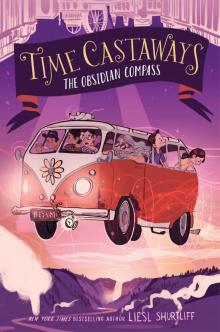 Time Castaways #2
Time Castaways #2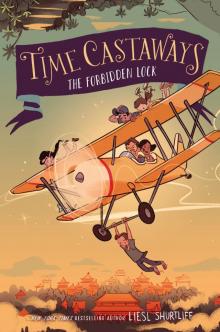 The Forbidden Lock
The Forbidden Lock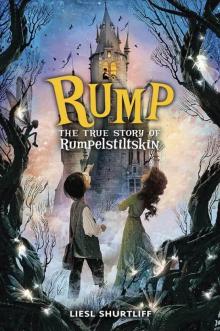 Rump: The True Story of Rumpelstiltskin
Rump: The True Story of Rumpelstiltskin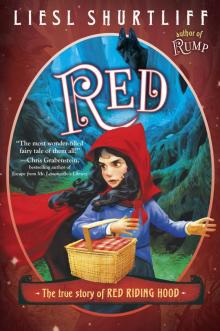 Red
Red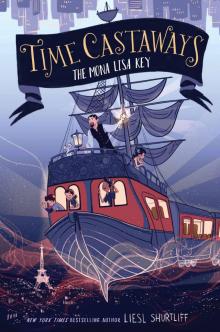 Time Castaways #1
Time Castaways #1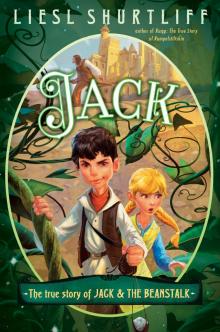 Jack
Jack